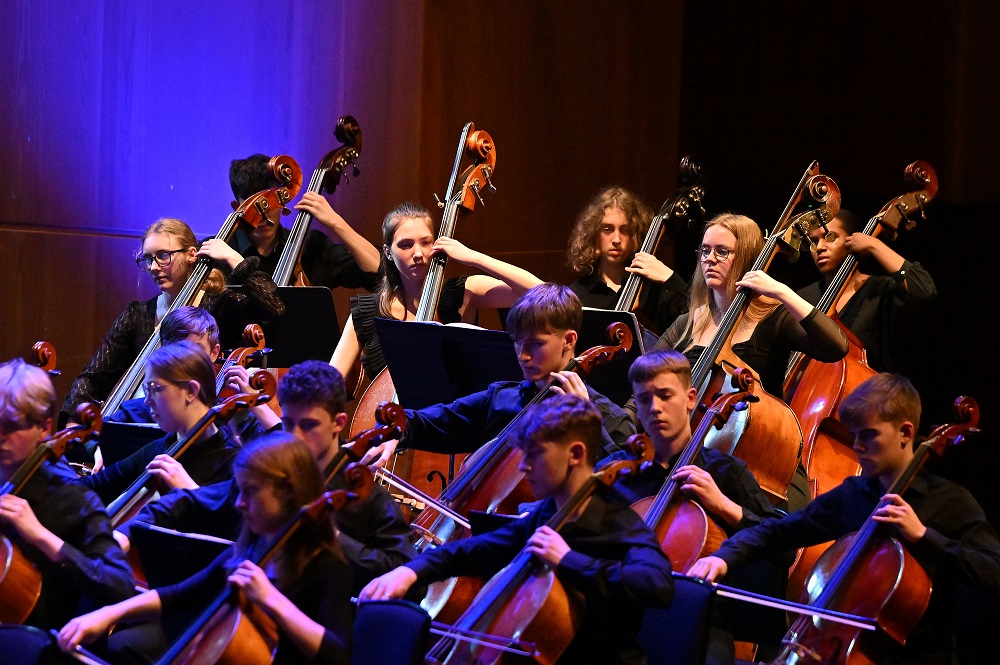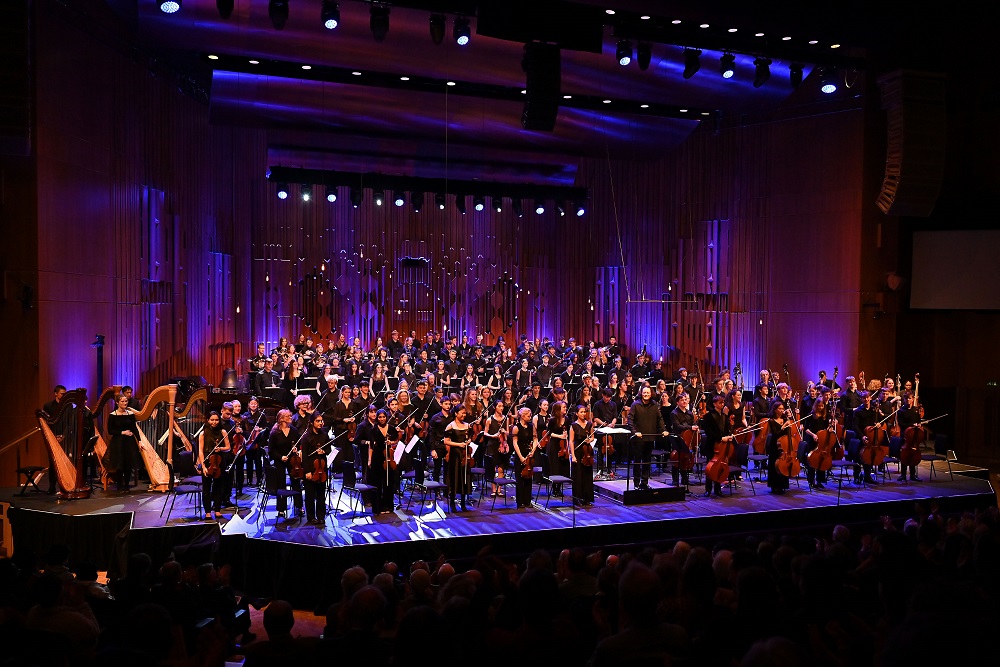National Youth Orchestra, Bloch, Barbican review - blazing and surging odysseys | reviews, news & interviews
National Youth Orchestra, Bloch, Barbican review - blazing and surging odysseys
National Youth Orchestra, Bloch, Barbican review - blazing and surging odysseys
Anna Clyne does melody alongside razor-sharp Britten and ecstatic Strauss
In precarious times, musical wonders never seem to cease – for now, at least. Who would have thought during lockdown that we’d be back so soon and so frequently to the kind of massive orchestra needed to play a cosmic blockbuster like Richard Strauss's Also sprach Zarathustra? Of the three live performances I’ve heard since September 2021, last night’s, the biggest and youngest (160 players aged 14 to 19), was also the freshest and most exciting.
To hear young people in the National Youth Orchestra of Great Britain playing a supremely challenging work which used to be second nature to hardened professionals, and under such a febrile conductor as Alexandre Bloch, was to return to what so thrilled my teenage self about this intoxicating music, and to the reason why the 20-year-old Bartók, hearing a 1901 performance in Budapest, decided that composing must be his vocation.
Strauss’s father once reproached him as a conductor for “serpentine gestures unbecoming in a beanpole such as you” – the son eventually became the model of gestural economy – and those were plentiful from Bloch. But he seemed to focus his vast forces in the big cavalcades. “Of Joys and Passions” swung with hallucinatory impetus into a totally together charge, full-throttle horns edging lustrous string sound. The orgy towards the big chimes at midnight has surely never been more thrilling, making the nocturne-payoff at the end all the more moving. There was plenty of atmosphere in the twilight zones, too, and a silky mystery about the start of the twelve-tone fugue (in 1896!) on to evoke “science and learning” from select numbers of the 12 double basses and 18 cellos (half the double-bassists behind some of the cellists pictured below). 
Totally deserving of this famous elemental company, Anna Clyne’s Rift served up a surprise: memorable melody, starting with the viola tune which goes on to be variously harmonized and scored, some of the tunes bravely verging on the banal in the manner of the underrated symphonies of Malcolm Arnold. I’d expected this to be a piece about process, allegedly taking us from “dust” via purifying “water” to “space”, and hadn’t expected the “hooks” so few contemporary composers bother to provide along the way. In fact the trajectory was hard to make out, despite the non-irritant stage and hall lighting, but the procession of brilliant ideas and quick contrasts, nothing outstaying its welcome, presumably rooted in Clyne’s brief to write ballet music in her collaboration with choreographer Kitty McNamee, more than made up for that. 
rating
Explore topics
Share this article
The future of Arts Journalism
You can stop theartsdesk.com closing!
We urgently need financing to survive. Our fundraising drive has thus far raised £49,000 but we need to reach £100,000 or we will be forced to close. Please contribute here: https://gofund.me/c3f6033d
And if you can forward this information to anyone who might assist, we’d be grateful.

Subscribe to theartsdesk.com
Thank you for continuing to read our work on theartsdesk.com. For unlimited access to every article in its entirety, including our archive of more than 15,000 pieces, we're asking for £5 per month or £40 per year. We feel it's a very good deal, and hope you do too.
To take a subscription now simply click here.
And if you're looking for that extra gift for a friend or family member, why not treat them to a theartsdesk.com gift subscription?
more Classical music
 BBC Proms: Faust, Gewandhausorchester Leipzig, Nelsons review - grace, then grandeur
A great fiddler lightens a dense orchestral palette
BBC Proms: Faust, Gewandhausorchester Leipzig, Nelsons review - grace, then grandeur
A great fiddler lightens a dense orchestral palette
 BBC Proms: Jansen, Royal Concertgebouw Orchestra, Mäkelä review - confirming a phenomenon
Second Prom of a great orchestra and chief conductor in waiting never puts a foot wrong
BBC Proms: Jansen, Royal Concertgebouw Orchestra, Mäkelä review - confirming a phenomenon
Second Prom of a great orchestra and chief conductor in waiting never puts a foot wrong
 BBC Proms: Royal Concertgebouw Orchestra, Mäkelä review - defiantly introverted Mahler 5 gives food for thought
Chief Conductor in Waiting has supple, nuanced chemistry with a great orchestra
BBC Proms: Royal Concertgebouw Orchestra, Mäkelä review - defiantly introverted Mahler 5 gives food for thought
Chief Conductor in Waiting has supple, nuanced chemistry with a great orchestra
 Dunedin Consort, Butt / D’Angelo, Muñoz, Edinburgh International Festival 2025 review - tedious Handel, directionless song recital
Ho-hum 'comic' cantata, and a song recital needing more than a beautiful voice
Dunedin Consort, Butt / D’Angelo, Muñoz, Edinburgh International Festival 2025 review - tedious Handel, directionless song recital
Ho-hum 'comic' cantata, and a song recital needing more than a beautiful voice
 Classical CDs: Dungeons, microtones and psychic distress
This year's big anniversary celebrated with a pair of boxes, plus clarinets, pianos and sacred music
Classical CDs: Dungeons, microtones and psychic distress
This year's big anniversary celebrated with a pair of boxes, plus clarinets, pianos and sacred music
 BBC Proms: Liu, Philharmonia, Rouvali review - fine-tuned Tchaikovsky epic
Sounds perfectly finessed in a colourful cornucopia
BBC Proms: Liu, Philharmonia, Rouvali review - fine-tuned Tchaikovsky epic
Sounds perfectly finessed in a colourful cornucopia
 BBC Proms: Suor Angelica, LSO, Pappano review - earthly passion, heavenly grief
A Sister to remember blesses Puccini's convent tragedy
BBC Proms: Suor Angelica, LSO, Pappano review - earthly passion, heavenly grief
A Sister to remember blesses Puccini's convent tragedy
 BBC Proms: A Mass of Life, BBCSO, Elder review - a subtle guide to Delius's Nietzschean masterpiece
Mark Elder held back from blasting the audience with a wall of sound
BBC Proms: A Mass of Life, BBCSO, Elder review - a subtle guide to Delius's Nietzschean masterpiece
Mark Elder held back from blasting the audience with a wall of sound
 BBC Proms: Le Concert Spirituel, Niquet review - super-sized polyphonic rarities
Monumental works don't quite make for monumental sounds in the Royal Albert Hall
BBC Proms: Le Concert Spirituel, Niquet review - super-sized polyphonic rarities
Monumental works don't quite make for monumental sounds in the Royal Albert Hall
 Frang, Romaniw, Liverman, LSO, Pappano, Edinburgh International Festival 2025 review - sunlight, salt spray, Sea Symphony
Full force of the midday sea in the Usher Hall, thanks to the best captain at the helm
Frang, Romaniw, Liverman, LSO, Pappano, Edinburgh International Festival 2025 review - sunlight, salt spray, Sea Symphony
Full force of the midday sea in the Usher Hall, thanks to the best captain at the helm
 Elschenbroich, Grynyuk / Fibonacci Quartet, Edinburgh International Festival 2025 review - mahogany Brahms and explosive Janáček
String partnerships demonstrate brilliant listening as well as first rate playing
Elschenbroich, Grynyuk / Fibonacci Quartet, Edinburgh International Festival 2025 review - mahogany Brahms and explosive Janáček
String partnerships demonstrate brilliant listening as well as first rate playing
 BBC Proms: Akhmetshina, LPO, Gardner review - liquid luxuries
First-class service on an ocean-going programme
BBC Proms: Akhmetshina, LPO, Gardner review - liquid luxuries
First-class service on an ocean-going programme

Add comment